Downton Abbey: The Finale, ITV1 | reviews, news & interviews
Downton Abbey: The Finale, ITV1
Downton Abbey: The Finale, ITV1
Why it worked: four writers on theartsdesk explain the hit drama's appeal
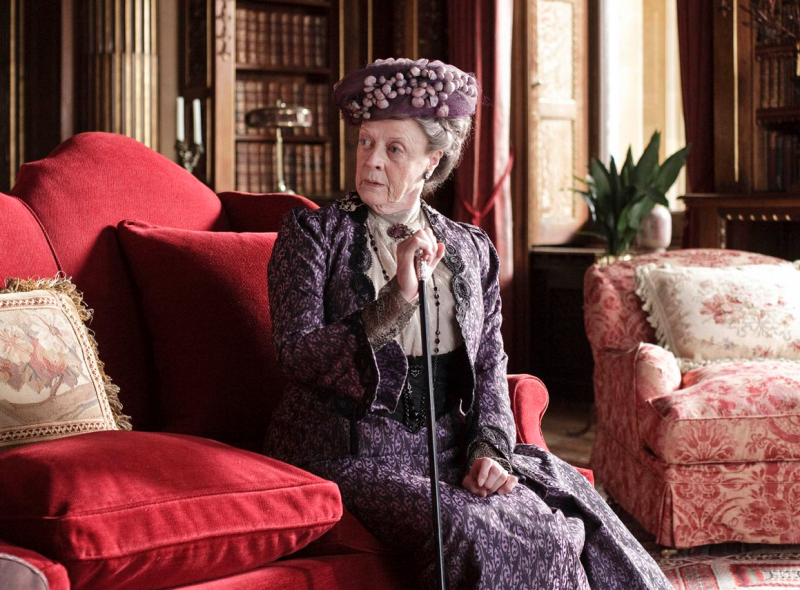
Defying predictions that there would be no audience for a period costume drama set in an Edwardian country house, Downton Abbey has become the TV event of 2010. Episode one notched 11.6 million viewers (including repeats and ITV Player viewings), while episode two edged up to 11.8 million.
The anguish of fans at the prospect of the first series coming to an end has been at least slightly assuaged by the news that a second series has already been commissioned, and overseas markets are battering at the doors of production company Carnival Films to get their hands on it. If Downton Abbey hasn't yet trounced The X Factor in the ratings war, it may none the less represent a watershed in British television. It has emphatically whipped the carpet out from under those who have tried to dance on the grave of quality TV drama, and ITV's chief executive Adam Crozier is even talking about Downton as his spearhead in a drive to take the network in an artsier, more drama-orientated direction.
As the first series completed its run, four writers on theartsdesk explain why, in their view, the series has worked so well, and also nominate their favourite upstairs character (excluding the Dowager Countess of Dame Maggie, who will no doubt be walking off with the Bafta), favourite downstairs character and, in a series full of them, the most far-fetched plotline. We urge you to join the debate and make your own nominations in the comments section.
Adam Sweeting:
It's odd that Downton Abbey's writer, Julian Fellowes, has been complaining about criticism of the show from "the Left", since a lot of it seems to have been on the letters page of The Daily Telegraph (the stuff about double yellow lines on the road and visible TV aerials). But the salient fact is that viewers are engaging intimately with Downton Abbey, to a fanatical and nitpicking degree, in a way which surely makes a nonsense of party lines, despite some kneejerk moaning about "toffs".
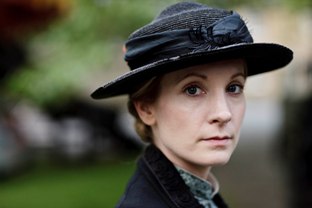 Indeed, this is where the true cunning of Fellowes's conception lies, since his masters-and-servants microclimate within Downton Abbey is inextricably linked to events in the world outside. It's true that the show is riddled with anachronisms - the Earl and Countess of Grantham would make fairly liberal-minded parents even in 2010, their politically radical daughter Lady Sybil always looks as if she's off for a weekend at Glastonbury, and even Maggie Smith's pantomime dowager has a heart, although perhaps not of gold, behind that facade of withering haughtiness.
Indeed, this is where the true cunning of Fellowes's conception lies, since his masters-and-servants microclimate within Downton Abbey is inextricably linked to events in the world outside. It's true that the show is riddled with anachronisms - the Earl and Countess of Grantham would make fairly liberal-minded parents even in 2010, their politically radical daughter Lady Sybil always looks as if she's off for a weekend at Glastonbury, and even Maggie Smith's pantomime dowager has a heart, although perhaps not of gold, behind that facade of withering haughtiness.
But what makes the drama grip is the way that irresistible social and political change is ticking away like a bomb buried under Downton's manicured lawns, whether it's the Irish chauffeur with a passion for socialism or the rise of the middle classes represented by cousin Matthew. And every character and storyline is overshadowed by the knowledge that this entire world is about to slide into the volcano of the Great War.
Favourite upstairs character? Robert, Earl of Grantham (Hugh Bonneville), a man of superhuman tolerance and reason.
Favourite downstairs character? Anna, the head housemaid (Joanne Froggatt, pictured above right), outwardly gentle but inwardly tough as old boots.
Most far-fetched plotline? Thomas the footman's gay conspiracy with the Duke of Crowborough to steal the Downton inheritance.
Alexandra Coghlan:
While harking back to the glory days of ITV costume drama, to The Jewel in the Crown, Brideshead Revisited and of course Upstairs Downstairs, Downton Abbey is also the canniest and most topical piece of programming currently gracing our screens. A world on the cusp of change; a ruling order under threat from the discontented masses; an international crisis looming ever closer: sound familiar? Downton Abbey is current affairs in corsets and crinolines – the sartorial spoonful of sugar that helps even the sharpest of social medicines go down.
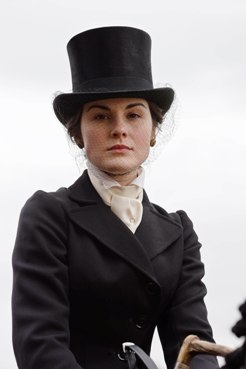 With consummate skill, Julian Fellowes has held up the mirror for us, and the graceful, soft-focus images it reflects back have proved seductive indeed. Who needs to confront reactionary Conservative policy when instead you can have Maggie Smith in a hat that could double as a soup tureen, inquiring: “A weekend? What precisely is a weekend?”
With consummate skill, Julian Fellowes has held up the mirror for us, and the graceful, soft-focus images it reflects back have proved seductive indeed. Who needs to confront reactionary Conservative policy when instead you can have Maggie Smith in a hat that could double as a soup tureen, inquiring: “A weekend? What precisely is a weekend?”
Who would trade the flesh wounds of contemporary social realism for its sepia-softened Edwardian counterpart, complete with orderly, cabbage-throwing riot and obligatory scratch to the temple. Period details and contemporary attitudes (the footman’s notorious “One swallow doesn’t make a summer” sexual encounter with a young aristo comes to mind) make for a combination just the right side of kitsch. Authentic it ain’t, but enjoyable? Unquestionably.
Favourite upstairs character? Lady Mary (Michelle Dockery, pictured above left), the envy of her sisters with the best outfits and the best lines.
Favourite downstairs character? The staunchly moral Mr Bates (Brendan Coyle).
Most far-fetched plotline? Carson's shady past as a music-hall entertainer.
Veronica Lee:
Downton Abbey has had quality written all over it - superb cast, terrific location, great costumes - but perhaps the £7 million ITV have spent on it shows most in the way its multiple storylines have been allowed to develop almost naturalistically over seven episodes. Writer and creator Julian Fellowes has proved himself a worthy contender for any number of awards, and I thought in the series’ very opening scenes – where he effortlessly introduced a large cast over the titles - he showed himself to be a master of economical exposition. I also love the comedy, some of it laugh-out-loud, but much of it subtle.
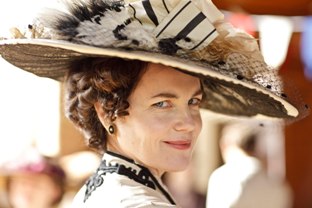 As to all the supposedly wrong historical detail, there are times when some of the language has indeed jarred and one is aware of a modern eye looking at a time long gone, but surely being able to nitpick is part of the pleasure? I think Downton feeds into a pleasurable reminiscence of those Sunday evenings when British families sat down together to watch, depending on the generation they belong to, The Forsyte Saga, The Onedin Line or (more recently) Cranford. In the age of iPlayer, Sky+ and TiVo, people have been switching off their phones and getting comfy on their sofas to watch Downton Abbey in real time, so that they may discuss it with their friends immediately after, or the next day at work or school. And that has made it an inclusive, rather than just an individual, pleasure.
As to all the supposedly wrong historical detail, there are times when some of the language has indeed jarred and one is aware of a modern eye looking at a time long gone, but surely being able to nitpick is part of the pleasure? I think Downton feeds into a pleasurable reminiscence of those Sunday evenings when British families sat down together to watch, depending on the generation they belong to, The Forsyte Saga, The Onedin Line or (more recently) Cranford. In the age of iPlayer, Sky+ and TiVo, people have been switching off their phones and getting comfy on their sofas to watch Downton Abbey in real time, so that they may discuss it with their friends immediately after, or the next day at work or school. And that has made it an inclusive, rather than just an individual, pleasure.
Favourite upstairs character? Lady Cora (Elizabeth McGovern, pictured above right), an outsider who quietly gets her way.
Favourite downstairs character? Miss O'Brien (Siobhan Finneran), a bitter, twisted thing of warped beauty.
Most far-fetched plotline? The Irish socialist chauffeur becoming matey with the Earl's youngest daughter.
Jasper Rees:
Downton Abbey was addictive despite often quite glaring flaws. In seven instalments the drama covered the three years from the sinking of the Titanic to the outbreak of the Great War, and yet everything that happened upstairs and down in the Crawleys’ world took place in glorious summer. Among other evidence that things in this Edwardian capsule were locked in evergreen permanence, there were two plotlines involving a servant with an embarrassing past and no fewer than three involving servants trying to hide an ailment.
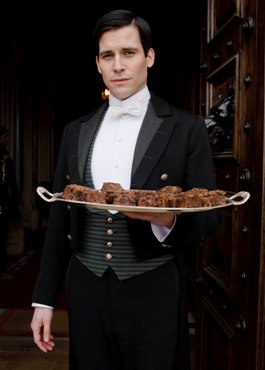 Perhaps in tribute to the genre from which it derives everything apart from the costumes, in the final episode there were even two plotlines with a starring role for a bar of soap. As Lord Grantham would no doubt concur, if it ain’t broke, don’t fix it.
Perhaps in tribute to the genre from which it derives everything apart from the costumes, in the final episode there were even two plotlines with a starring role for a bar of soap. As Lord Grantham would no doubt concur, if it ain’t broke, don’t fix it.
In dramaturgical terms, His Grace was the biggest victim of Julian Fellowes’s well-documented fondness for the old order. Fellowes's scripts embalmed that fantasy of a hierarchical society in eternal stasis by giving Hugh Bonneville's kindly patriarch an essentially plotless existence. He didn't want a scene over the petty larceny of the footman Thomas, and his wishes were met. No matter that audiences were crying out for a show-down. Nor did the Earl of Grantham ever find out about Lady Mary's tumble with the Turk. Indeed Lady Cora's terminal horror at her daughter's disgrace lasted the length of a commercial break. Meanwhile, as a storyline the entail went deep undercover for several hours of screen time.
Visually, too, it’s all been a bit of a dog’s dinner. The three different directors (Brian Percival, Ben Bolt and Brian Kelly) pursued widely varying notions of how the stories should unfold pictorially. Half the time one character would plod into shot to begin a dialogue with another seated character, but then there were weird moments of experimentalism. When Lady Mary overheard one titbit, for example, the camera homed in from behind on Michelle Dockery’s ear like something straight out of Buñuel. For one of the flower-show scenes I could have sworn Tristan Tzara was in the edit suite doing his Dadaist cut-up technique. And because she had so many tête-à-têtes, we saw far too much of the back of Dame Maggie’s head (pictured below).
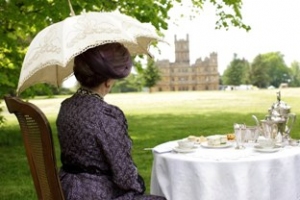 The worst of it was that, defying a basic rule of good popular drama, not a single plotline was satisfactorily resolved. One housemaid got a job as a secretary: that was it. By the final episode, Bates's stoicism had become actively anti-dramatic; it's a measure of Brendan Coyle's charisma that he contrived to deliver Bates's enigmatic final speech without projectiles being hurled at screens up and down the land.
The worst of it was that, defying a basic rule of good popular drama, not a single plotline was satisfactorily resolved. One housemaid got a job as a secretary: that was it. By the final episode, Bates's stoicism had become actively anti-dramatic; it's a measure of Brendan Coyle's charisma that he contrived to deliver Bates's enigmatic final speech without projectiles being hurled at screens up and down the land.
Some of these infelicities were doubtless the result of budgetary constraints. In Granada’s golden age, Downton Abbey might in real terms have cost three times as much. So how on earth did it work so gloriously? For one, like all good soap, it was just terribly moreish. And as great British television actors always will, the cast had worked out exactly what was wanted of them and delivered with consummate skill. Finally, for good or ill, the great British viewing public seems to like drama about a world pickled in aspic where everyone knows their place. The old respect for deference and heritage dies hard. But all those loose ends? They amount to a kind of sadism.
Favourite upstairs character? Mrs Crawley (Penelope Wilton), the bluestocking who relishes a (very polite) dogfight.
Favourite downstairs character? Thomas (Rob James-Collier, pictured above left), the dastardly gay first footman with a finger in all the wrong pies.
Most far-fetched plotline? The Turkish diplomat's inconvenient death by coitus.
Watch Julian Fellowes and some of the cast talking about Downton Abbey:
Share this article
Add comment
The future of Arts Journalism
You can stop theartsdesk.com closing!
We urgently need financing to survive. Our fundraising drive has thus far raised £49,000 but we need to reach £100,000 or we will be forced to close. Please contribute here: https://gofund.me/c3f6033d
And if you can forward this information to anyone who might assist, we’d be grateful.

Subscribe to theartsdesk.com
Thank you for continuing to read our work on theartsdesk.com. For unlimited access to every article in its entirety, including our archive of more than 15,000 pieces, we're asking for £5 per month or £40 per year. We feel it's a very good deal, and hope you do too.
To take a subscription now simply click here.
And if you're looking for that extra gift for a friend or family member, why not treat them to a theartsdesk.com gift subscription?
more TV
 Murder Before Evensong, Acorn TV review - death comes to the picturesque village of Champton
The Rev Richard Coles's sleuthing cleric hits the screen
Murder Before Evensong, Acorn TV review - death comes to the picturesque village of Champton
The Rev Richard Coles's sleuthing cleric hits the screen
 Black Rabbit, Netflix review - grime and punishment in New York City
Jude Law and Jason Bateman tread the thin line between love and hate
Black Rabbit, Netflix review - grime and punishment in New York City
Jude Law and Jason Bateman tread the thin line between love and hate
 The Hack, ITV review - plodding anatomy of twin UK scandals
Jack Thorne's skill can't disguise the bagginess of his double-headed material
The Hack, ITV review - plodding anatomy of twin UK scandals
Jack Thorne's skill can't disguise the bagginess of his double-headed material
 Slow Horses, Series 5, Apple TV+ review - terror, trauma and impeccable comic timing
Jackson Lamb's band of MI5 misfits continues to fascinate and amuse
Slow Horses, Series 5, Apple TV+ review - terror, trauma and impeccable comic timing
Jackson Lamb's band of MI5 misfits continues to fascinate and amuse
 Coldwater, ITV1 review - horror and black comedy in the Highlands
Superb cast lights up David Ireland's cunning thriller
Coldwater, ITV1 review - horror and black comedy in the Highlands
Superb cast lights up David Ireland's cunning thriller
 Blu-ray: The Sweeney - Series One
Influential and entertaining 1970s police drama, handsomely restored
Blu-ray: The Sweeney - Series One
Influential and entertaining 1970s police drama, handsomely restored
 I Fought the Law, ITVX review - how an 800-year-old law was challenged and changed
Sheridan Smith's raw performance dominates ITV's new docudrama about injustice
I Fought the Law, ITVX review - how an 800-year-old law was challenged and changed
Sheridan Smith's raw performance dominates ITV's new docudrama about injustice
 The Paper, Sky Max review - a spinoff of the US Office worth waiting 20 years for
Perfectly judged recycling of the original's key elements, with a star turn at its heart
The Paper, Sky Max review - a spinoff of the US Office worth waiting 20 years for
Perfectly judged recycling of the original's key elements, with a star turn at its heart
 The Guest, BBC One review - be careful what you wish for
A terrific Eve Myles stars in addictive Welsh mystery
The Guest, BBC One review - be careful what you wish for
A terrific Eve Myles stars in addictive Welsh mystery
 theartsdesk Q&A: Suranne Jones on 'Hostage', power pants and politics
The star and producer talks about taking on the role of Prime Minister, wearing high heels and living in the public eye
theartsdesk Q&A: Suranne Jones on 'Hostage', power pants and politics
The star and producer talks about taking on the role of Prime Minister, wearing high heels and living in the public eye
 King & Conqueror, BBC One review - not many kicks in 1066
Turgid medieval drama leaves viewers in the dark
King & Conqueror, BBC One review - not many kicks in 1066
Turgid medieval drama leaves viewers in the dark
 Hostage, Netflix review - entente not-too-cordiale
Suranne Jones and Julie Delpy cross swords in confused political drama
Hostage, Netflix review - entente not-too-cordiale
Suranne Jones and Julie Delpy cross swords in confused political drama

Comments
...
...
...
...
...
...
...
...
...